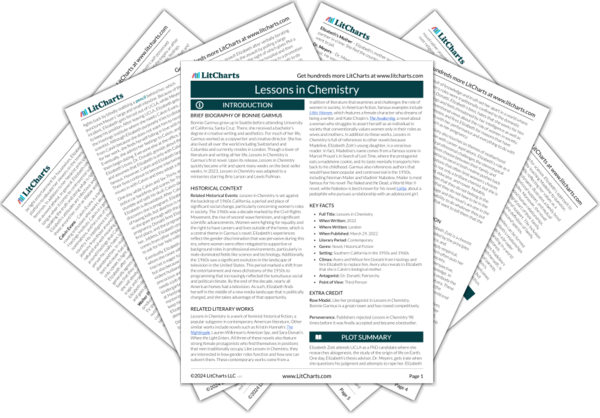Elizabeth’s life is marked by a series of traumatic events, including professional setbacks, sexual assaults, and personal losses. One of the most poignant aspects of her story is the loss of her partner, Calvin Evans, which leaves her a single mother. This loss is a profound turning point in Elizabeth’s life, deeply affecting her emotional landscape and her approach to the world around her. The way Elizabeth deals with her traumas is central to the novel’s message about a person’s ability to heal and move forward in the aftermath of pain and loss. She does not succumb to despair or allow her circumstances to define her. Instead, she channels her pain and experiences into her work and into raising her daughter, Madeline. Elizabeth’s resilience is inspiring: she confronts her challenges with a scientific mindset, analyzing problems and devising solutions, whether they pertain to a chemical experiment or to life’s obstacles. Although she often feels overwhelmed, Elizabeth does not let the negative aspects of her life keep her down. Rather, she challenges herself and those around her to work to create a better world. For instance, after Life magazine publishes a disparaging article about her, Elizabeth uses her next performance on Supper at Six to publicly address her unfair treatment and gender discrimination in the workplace. By addressing her problems directly, she not only inspires herself to keep going, but she also sends a positive and socially constructive message to everyone willing to lesson. Ultimately, then, the novel’s message is that even the worst traumas and adversarial situations can be overcome. Although personal losses will always sting, the novel argues that it’s possible to turn adverse circumstances into positive outcomes—and that doing so can be beneficial in the long run.
Overcoming Tragedy and Trauma ThemeTracker

Overcoming Tragedy and Trauma Quotes in Lessons in Chemistry
Now, sitting rigidly on her stool in the lab, she could hear a policeman talking about someone who’d died and someone else insisting she take his handkerchief and still another saying something about a vet, but all she could think about was that moment long ago when her toes had touched bottom, the soft, silky mud inviting her to stay. Knowing what she knew now, she could only think one thing: I should have.

Unlock explanations and citation info for this and every other Lessons in Chemistry quote.
Plus so much more...
Get LitCharts A+Crouching, he waited for the man to leave, then relaxed his body down the length of the casket buried below. Hello, Calvin.
This is how he communicated with humans on the other side. Maybe it worked; maybe it didn’t. He used the same technique with the creature growing inside Elizabeth. Hello, Creature, he transmitted as he pressed his ear into Elizabeth’s belly. It’s me, Six-Thirty. I’m the dog.
So, sometime after it was all over, when a nurse came in with a stack of papers demanding to know something—how she felt?—she decided to tell her.
“Mad.”
“Mad?” the nurse had asked.
“Yes, mad,” Elizabeth had answered. Because she was. “Are you sure?” the nurse had asked.
“Of course I’m sure!”
And the nurse, who was tired of tending to women who were never at their best—this one had practically engraved her name on her arm during labor—wrote “Mad” on the birth certificate and stalked out.
So there it was: the baby’s legal name was Mad. Mad Zott.
“No, Mad,” Elizabeth said. “The person who wants to interview me isn’t even a science reporter; he writes for the women’s page. He’s already told me he has no interest in talking about chemistry, just dinner. Clearly, he doesn’t understand you can’t separate the two. And I suspect he also wants to ask questions about our family, even though our family is none of his business.”
“Why not?” Madeline asked. “What’s wrong with our family?”
“As for Calvin’s death,” she said, “I’m one hundred percent responsible.” He paled as she went on to describe the accident and the leash and the sirens, and how because of it, she would never hold anyone back in any way, ever again. As she saw it, his death spawned a series of other failures: blindsided by Donatti’s theft, she’d given up her research; determined to help her daughter fit in, she’d enrolled her in a school where she did not; worse, she’d become the very person she least wanted to be, a performer like her father.
“You’re a scientist,” he said. “Your job is to question things—to search for answers. But sometimes—and I know this for a fact—there just aren’t any.
“Let’s say supper at six, then,” Elizabeth said, not wanting her to go. “The home lab. Everyone—you, Wilson, Mad, Sixty-Thirty, me, Harriet, Walter. You’ll need to meet Wakely and Mason at some point, too. The whole family.”
Avery Parker, her face suddenly familiar with Calvin’s smile, turned back and took Elizabeth’s hands in her own. “The whole family,” she said.











